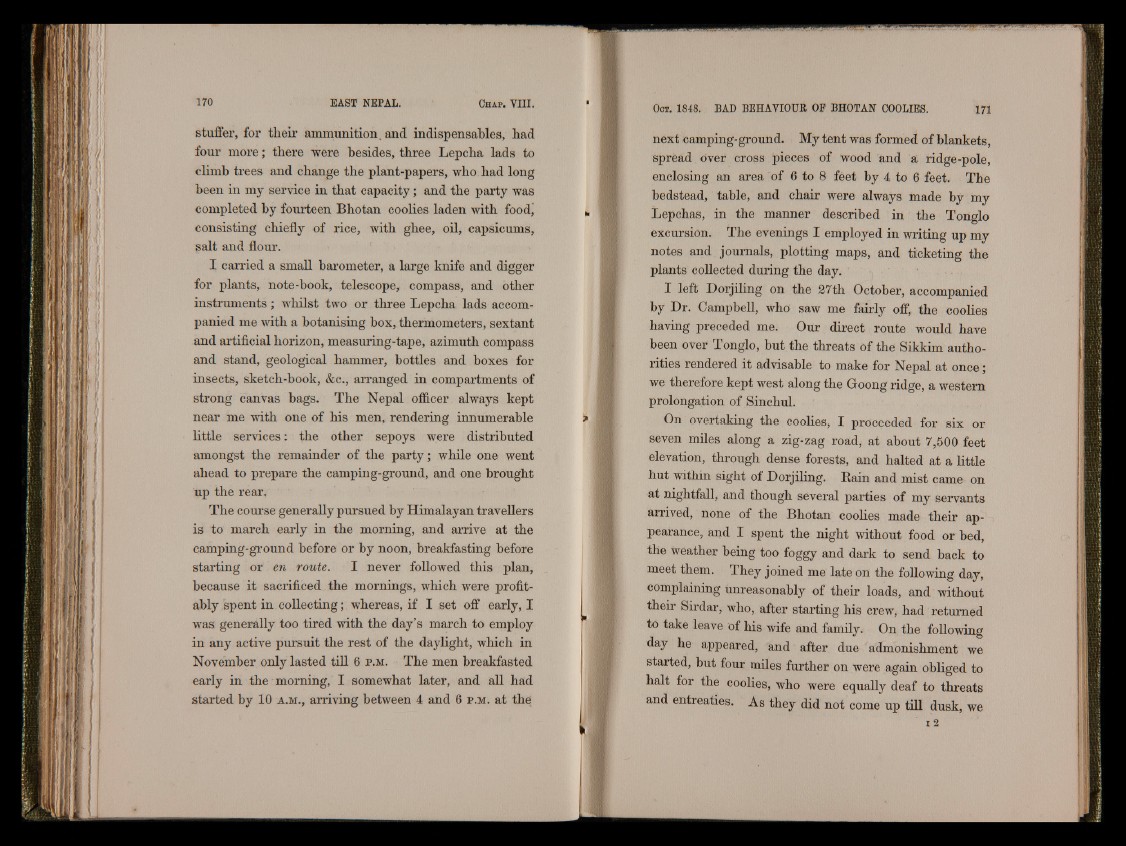
stuffer, for their ammunition, and indispensables, had
four more; there were besides, three Lepcha lads to
climb trees and change the plant-papers, who had long
been in my service in that capacity; and the party was
completed by fourteen Bhotan coolies laden with food,
consisting chiefly of rice, with ghee, oil, capsicums,
salt and flour.
I carried a small barometer, a large knife and digger
for plants, note-book, telescope, compass, and other
instruments; whilst two or three Lepcha lads accompanied
me with a botanising box, thermometers, sextant
and artificial horizon, measuring-tape, azimuth compass
and stand, geological hammer, bottles and boxes for
insects, sketch-book, &c., arranged in compartments of
strong canvas bags. The Nepal officer always kept
near me with one of his men, rendering innumerable
little services: the other sepoys were distributed
amongst the remainder of the p a rty; while one went
ahead to prepare the camping-ground, and one brought
up the rear.
The course generally pursued by Himalayan travellers
is to march early in the morning, and arrive at the
camping-ground before or by noon, breakfasting before
starting or en route. I never followed this plan,
because it sacrificed the mornings, which were profitably
spent in collecting; whereas, if I set off early, I
was generally too tired with the day’s march to employ
in any active pursuit the rest of the daylight, which in
November only lasted till 6 p .m . The men breakfasted
early in the morning, I somewhat later, and all had
started by 10 a .m ., arriving between 4 and 6 p .m . at the
next camping-ground. My tent was formed of blankets,
spread over cross pieces of wood and a, ridge-pole,
enclosing an area of 6 to 8 feet by 4 to 6 feet. The
bedstead, table, and chair were always made by my
Lepchas, in the manner described in the Tonglo
excursion. The evenings I employed in writing up my
notes and journals, plotting maps, and ticketing the
plants collected during the day.
I left Dorjiling on the 27th October, accompanied
by Dr. Campbell, who saw me fairly off, the coolies
having preceded me. Our direct route would have
been over Tonglo, but the threats of the Sikkim authorities
rendered it advisable to make for Nepal at once;
we therefore kept west along the Groong ridge, a western
prolongation of Sinchul.
On overtaking the coolies, I proceeded for six or
seven miles along a zig-zag road, at about 7,500 feet
elevation, through dense forests, and halted at a little
hut within sight of Dorjiling. Rain and mist came on
at nightfall, and though several parties of my servants
arrived, none of the Bhotan coolies made their appearance,
and I spent the night without food or bed,
the weather being too foggy and dark to send back to
meet them. They joined me late on the following day,
complaining unreasonably of their loads, and without
their Sirdar, who, after starting his crew, had returned
to take leave of his wife and family. On the following
day he appeared, and after due admonishment we
started, but four miles further on were again obliged to
halt for the coolies, who were equally deaf to threats
and entreaties. As they did not come up till dusk, we
i 2